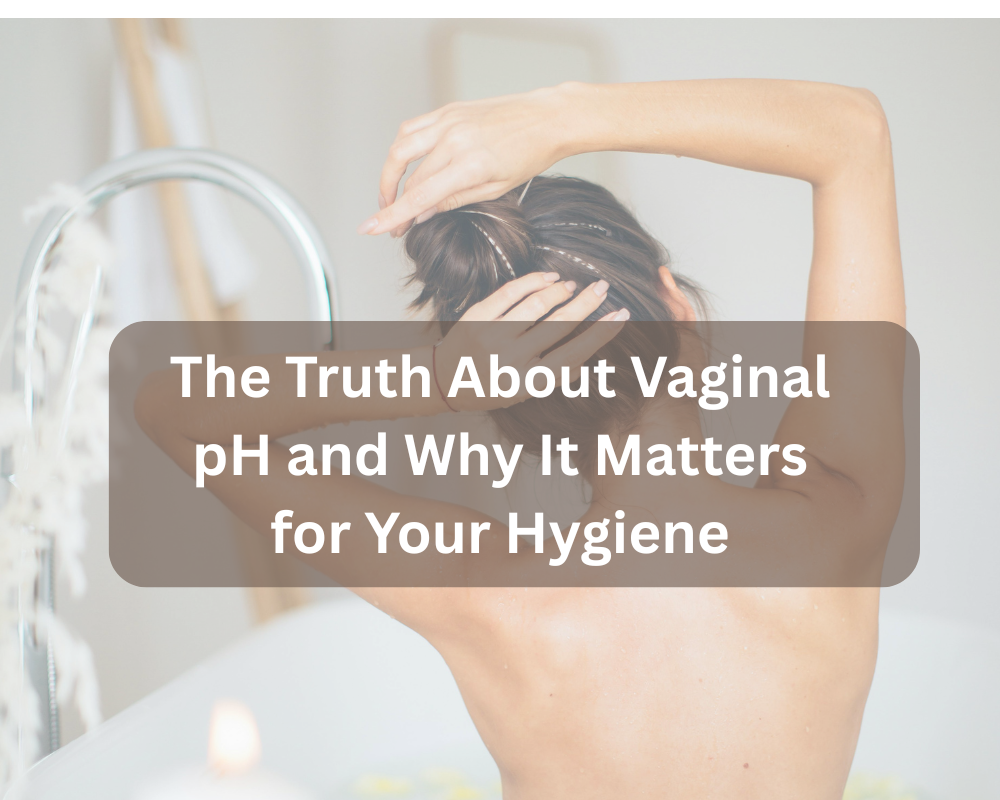There is much advice on feminine care, but one important subject individuals usually ignored is vaginal pH. Your general comfort, health, and confidence are all greatly affected by this little aspect. Your pH balance could be the quiet offender if you’ve ever experienced itching, stench, or irritation and couldn’t identify the cause. This situation is obviously a place no one wants to me in.
Understanding vaginal pH is crucial for your hygiene regimen; in this blog post ,we shall examine why and how to maintain this sensitive balance with basic, deliberate care.
What Is Vaginal pH, and Why Does It Matter?
Your vagina is its own natural ecosystem meant to keep healthy on its own and guard you from infections. Included in that system is pH, sometimes known as “potential hydrogen,” a gauge of acidity or alkalinity of anything. From 0 to 14, the pH scale.
0–6.9: Sour
7: Neutral
Alkaline 7.1–14
Usually, a healthy vaginal pH is between 3.8 to 4.5, which is very acidic. This acidity is important since it helps the development of healthy bacteria which is mostly lactobacilli and stops the proliferation of dangerous bacteria and yeast.
Indicators Your Vaginal pH Could Be Off
A change in pH level makes your vagina more susceptible to diseases including yeast infections or bacterial vaginosis (BV). Here are a few indicators your pH might be off:
- Strange fragrance, particularly a fishy one
- Overabundant or stained discharge
- Irritation or itching
- Painful urination
- Repeated infections
Should you have any of these symptoms frequently, you should consult your doctor and go over your hygiene practices.
What Brings About Vaginal pH Imbalance?
Your vaginal pH can change for a number of causes, including:
1. Applying Scented Products or Harsh Soaps
Cleansers with strong chemicals or scents might upset your natural acidity and remove the beneficial microorganisms.
Try using warm water or a mild, pH-balanced, fragrance-free feminine wash.
2. Douching
Though it may appear to make you “extra clean,” douching really removes the natural protecting bacteria of your vagina.
Advice: Avoid the douches. Believe in your body’s natural process.
3. Sex Without Protection
Frequent unprotected sex might momentarily increase your vaginal pH since semen is alkaline.
Especially if you’re infection-prone, think about using condoms.
4. Antibiotics
These drugs can also destroy the beneficial ones that support your pH besides killing harmful germs.
While taking antibiotics, include probiotics in your diet to help maintain balance.
5. Menstruation
The alkaline quality of blood causes your period to somewhat alter your pH.
Tip: Think about organic menstrual products and change pads/tampons often.
How to Support a Healthy Vaginal pH Naturally
Your regular hygiene practices are more important than you believe. Here is how to maintain comfort and balance:
1. Select the Appropriate Cleansers
For intimate care, use just pH-balanced products. These are especially meant to not disturb your natural acidity.
pH-balanced feminine wash, intimate hygiene advice
2. Use Breathable Cotton Underwear
Synthetic textiles hold moisture and heat, hence fostering bacterial growth.
Tip: Avoid wearing tight clothes for too long and switch to cotton underwear.
3. Keep Hydrating
Water flushes away contaminants and promotes general health including your vaginal environment.
Try for at least eight glasses of water daily.
4.Include Probiotics in Your Diet
Probiotics in the form of pills, sauerkraut, kombucha, or yogurt help feed good bacteria.
Natural pH balance, probiotics for vaginal health
5. Have Safe Sex
Before and after intimacy, practice frequent hygiene and use protection.
Best Products to Help Maintain pH Balance
- Fragrance-free, pH-balanced feminine washes
- Organic pantyliners or pads without aroma
- Medical-grade silicone menstrual cups
- Probiotic pills designed for women’s health
- Breathable, moisture-wicking underwear
Myth: You Must Smell Like Flowers
The reality is A healthy vagina has a natural smell that should not be covered. To remain fresh, you don’t need scented wipes, powders, or sprays. By upsetting your pH or irritating sensitive tissue, these products usually do more harm than good.
Real freshness is delicate hygiene plus healthy balance.
When to Consult a Physician
Don’t wait, talk to your doctor or gynecologist if you’re experiencing ongoing infections or discomfort despite doing everything correctly. They can assist in finding any underlying reasons and help you in the direction of recovery.
Final Thoughts: Respect Your Body’s Natural Balance
Knowing your vaginal pH helps you to look after yourself in a more educated, deeper manner. Feminine hygiene is about doing what is right for your body, not about doing more. Supporting your body’s natural equilibrium with simple habits and conscious decisions will help you not only to feel fresher but also to feel more secure in your own skin.
Next time you consider your hygiene practices, keep in mind that it’s not only a beauty habit. It’s included in your whole healthiness. Let your inherent beauty show by keeping it light, uncomplicated, and encouraging.
Frequently Asked Questions (FAQs)
1. What is the normal vaginal pH level?
The healthy vaginal pH typically falls between 3.8 and 4.5. This slightly acidic environment helps prevent infections by maintaining the right balance of good bacteria (like lactobacilli) and discouraging harmful ones from growing.
2. What causes vaginal pH to become unbalanced?
Several factors can throw off your pH balance, including:
- Harsh soaps or douching
- Unprotected sex
- Menstruation
- Certain medications or antibiotics
- Tight, non-breathable underwear
3. How can I tell if my vaginal pH is off?
Common signs of pH imbalance include:
- Unusual odor
- Itching or irritation
- Abnormal discharge
- Frequent infections like bacterial vaginosis or yeast infections
If you notice any of these symptoms, consult a healthcare provider.
4. Can diet affect vaginal pH?
Yes. Eating a balanced diet rich in probiotics (like yogurt, kefir, and fermented foods) and drinking plenty of water can support healthy vaginal flora. Avoid excessive sugar, which can feed yeast and worsen imbalance.
5. Are over-the-counter pH balancing products safe?
Some can help, but use caution. Products labeled “pH balancing” may still contain irritants or fragrances. Always look for gynecologist-approved, fragrance-free, and pH-balanced products especially for intimate care.
6. Is it safe to use soap down there?
You don’t need soap internally, the vagina is self-cleaning. For external cleansing, choose a mild, unscented, pH-balanced feminine wash or just warm water.
7. How often should I check my pH?
There’s no need to routinely test unless you’re experiencing symptoms. However, at-home pH test kits are available if you’re curious or monitoring a recurring issue. Still, any concerns should be discussed with your doctor.






